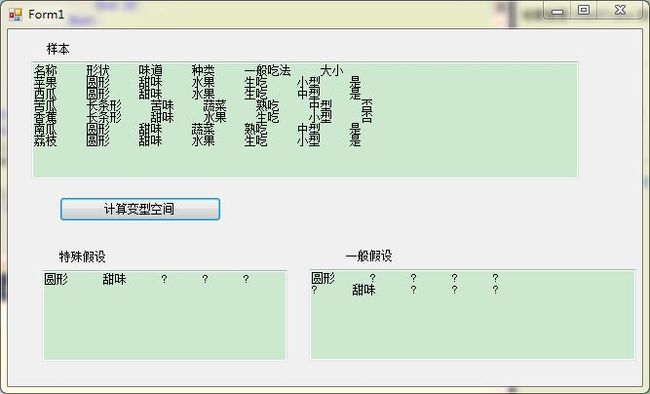机器学习-候选消除法
Imports System.IO
Public Class Form1
Private Sub Button1_Click(ByVal sender As System.Object, ByVal e As System.EventArgs) Handles Button1.Click
TextBox3.Text = ""
TextBox2.Text = ""
'属性个数
Dim xmcount As Integer = 0
Dim mysr As StreamReader
Dim strline As String
'是否正例
Dim iszl As Boolean
Dim mystr As String()
'标题名称
Dim xmname() As String
'变型空间
Dim bxkj As New ArrayList()
Dim tempsuppose As String()
'一般假设
Dim common_suppose As New ArrayList()
'特殊假设
Dim specific_suppose As String()
'读取样本文件
mysr = New StreamReader("e:\mydata.txt", System.Text.Encoding.Default)
'第一行是标题
strline = mysr.ReadLine()
TextBox1.Clear()
mystr = strline.Split(New Char() {",", ","})
'取属性个数
xmcount = mystr.GetUpperBound(0)
ReDim xmname(xmcount)
'初始化假设数组
ReDim specific_suppose(xmcount)
ReDim tempsuppose(xmcount)
For my_i As Integer = 0 To xmcount
specific_suppose(my_i) = Nothing
Next
For my_i As Integer = 0 To xmcount
tempsuppose(my_i) = "?"
Next
common_suppose.Add(tempsuppose)
'取得标题内容
xmname = mystr
Dim i As Integer = 0
For Each s As String In xmname
If s.Trim() <> "" Then
TextBox1.AppendText(s & Space(5))
End If
Next s
'分析样本每一行
While (Not mysr.EndOfStream)
strline = mysr.ReadLine()
If Trim(strline) = "" Then Exit While
TextBox1.AppendText(vbCrLf)
mystr = strline.Split(New Char() {",", ","})
'取样本性质
If Trim(mystr(xmcount + 1)) = "是" Then
iszl = True
Else
iszl = False
End If
TextBox1.AppendText(mystr(0) & Space(5))
'读取一行中的每个属性,最后一个属性指示了样本是正例还是反例,不能做为分析内容
For my_i As Integer = 1 To xmcount
TextBox1.AppendText(mystr(my_i) & Space(5))
If iszl Then
'正例
'设置特殊假设
If IsNothing(specific_suppose(my_i)) Then
'如果特殊假设的该属性未设定,则设定为样本的该属性值
specific_suppose(my_i) = mystr(my_i)
ElseIf specific_suppose(my_i) <> "?" And specific_suppose(my_i) <> mystr(my_i) Then
'如果特殊假设的该属性已设定,且不为当前样本值,则设定为?,可以接受任何值
specific_suppose(my_i) = "?"
End If
'设置一般假设
For my_ii As Integer = 0 To common_suppose.Count - 1
tempsuppose = TryCast(common_suppose.Item(my_ii), String())
If Not IsNothing(tempsuppose) Then
If tempsuppose(my_i) <> "?" And tempsuppose(my_i) <> mystr(my_i) Then
common_suppose.Item(my_ii) = Nothing
End If
End If
Next
Else
'反例
'设置一般假设
For my_ii As Integer = 0 To common_suppose.Count - 1
tempsuppose = TryCast(common_suppose.Item(my_ii), String())
If Not IsNothing(tempsuppose) Then
If mystr(my_i) = tempsuppose(my_i) Then
common_suppose.Item(my_ii) = Nothing
End If
End If
Next
tempsuppose = Nothing
ReDim tempsuppose(xmcount)
For my_iii As Integer = 1 To xmcount
If my_iii <> my_i Then
tempsuppose(my_iii) = "?"
Else
tempsuppose(my_iii) = specific_suppose(my_i)
End If
Next
'如果没有重复元素则增加
Dim iscf As Boolean
For my_ii As Integer = 0 To common_suppose.Count - 1
iscf = True
Dim mytempsuppose As String() = TryCast(common_suppose.Item(my_ii), String())
If Not IsNothing(mytempsuppose) Then
For mmm_i As Integer = 1 To xmcount
If Trim(tempsuppose(mmm_i)) <> Trim(mytempsuppose(mmm_i)) Then
iscf = False
End If
Next
End If
If iscf And (Not IsNothing(mytempsuppose)) Then
Exit For
End If
Next
If Not iscf Then
common_suppose.Add(tempsuppose)
End If
End If
Next my_i
TextBox1.AppendText(mystr(xmcount + 1) & Space(6))
If Not iszl Then
Dim isdel As Boolean
For my_ii As Integer = 0 To common_suppose.Count - 1
isdel = True
tempsuppose = TryCast(common_suppose.Item(my_ii), String())
If Not IsNothing(tempsuppose) Then
For mm_i As Integer = 1 To xmcount
If Trim(tempsuppose(mm_i)) <> "?" Then
isdel = False
End If
Next
End If
If isdel Then
common_suppose.Item(my_ii) = Nothing
End If
Next
End If
End While
For my_i As Integer = 1 To xmcount
TextBox2.Text &= specific_suppose(my_i) & Space(6)
Next
For my_iiii As Integer = 0 To common_suppose.Count - 1
If Not IsNothing(common_suppose.Item(my_iiii)) Then
tempsuppose = TryCast(common_suppose.Item(my_iiii), String())
For m_i As Integer = 1 To xmcount
TextBox3.Text &= tempsuppose(m_i) & Space(6)
Next
TextBox3.Text &= vbCrLf
End If
Next
MsgBox("变型空间在特殊假设和一般假设划分出来")
End Sub
End Class
e:\mydata.txt内容如下:
名称,形状,味道,种类,一般吃法,大小
苹果,圆形,甜味,水果,生吃,小型,是
西瓜,圆形,甜味,水果,生吃,中型,是
苦瓜,长条形,苦味,蔬菜,熟吃,中型,否
香蕉,长条形,甜味,水果,生吃,小型,否
南瓜,圆形,甜味,蔬菜,熟吃,中型,是
荔枝,圆形,甜味,水果,生吃,小型,是
候选消除法用于收集和归纳样本的特征,得出变型空间 ,然后可以对未知样本进行分类方法,它建立在对样本属性集的分析上总结基础上,基本原理是:
1、设立2个假设,一个是一般假设,一个是特殊假设,通过对每条样本的分析,扩大特殊假设,缩小一般假设。
2、假设就是对样本的每个属性值的设定,可以设定为固定值,也可以设定为未知值?即,什么值都可以接受,如果设为nothing,表示任何属性值都不接受
3、每分析一行,就提取每行的样本的各个属性
1)对于正例:
需要删除一般假设中与正例不符合的假设
需要将特殊假设中与正例不符合的属性删除(即改为“?”),开始特殊假设全部为NOTHING,即不接受任何属性值
2)对于反例
需要删除一般假设中与反例符合的假设,然后增加含有与反例不一致的属性值,其他属性值为“?”的假设
3)实质是一般假设说明了反例的特征,特殊假设说明了正例特征
